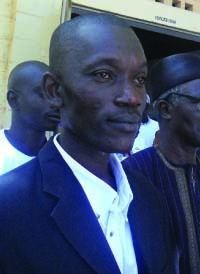
Following the recent distribution of farming implements to farmers across the country by the Gambia Emergency Agricultural Production Project (GEAPP) through the department of Agriculture, the management of GEAPP has found out that it was not sufficient to hand over the farming implements without building the capacity of the beneficiaries on the usage of the farming machineries.
It is against this background that the management of GEAPP decided to allocate some packages for the beneficiaries through capacity building targeting three hundred power tiller operators countrywide.
In this regard, the GEAPP on Wednesday commenced a five-day nationwide training for 300 power tiller operators.
The exercise started at Kerewan with sixty participants from sixty communities within Lower and Upper Niumi districts.
The training, spearheaded by the project coordinator of the GEAPP, Sheikh Tijan Sosseh, was organised through the Village Development Committees and the Regional Directorates of Agriculture within the six regions of the country.
In his welcoming remarks, the Chief of Lower Badibou, Fafanding Kinteh, expressed delight at the initiative of the GEAPP for making the training a reality in his district. This is a clear demonstration that the Gambia government has high regard for farmers in the country, he says.
Mr Kinteh said that for the past few years, Gambian farmers have been experiencing difficulties in the improvement of their agricultural production, but with the intervention of the GEAPP, "there is no doubt that farmers would meet the MDGs in terms of food security".
The GEAPP would contribute immensely towards eradicating poverty in the country, he said, noting that "its intervention is timely".
For his part, the Governor of the North Bank Region, Edward Seckan, commended the Gambia government for creating such projects as the GEAPP, which, he says, is geared towards eradicating hunger in the country.
The training, he added, would create job opportunities for youth at their various village levels.
Governor Seckan added that the distributed power tillers would go a long way in enhancing agricultural productivity in the country.
He challenged the Village Development Committee members and the regional directors of agriculture to ensure that justice is done in the distribution of the farming machineries.
The North Bank Region Governor commended the management of the GEAPP through the department of agriculture for their commitment, hard work and patriotism to national development.
Dr Saikou Sanyang, regional director of Agriculture in Kerewan, underscored the importance of empowering the farmers across the country, saying it is a clear indication that poverty will be eradicated and food self-sufficiency restored.
According to him, the Gambia has over the years provided the necessary requirements towards greater agricultural production.
He implored the beneficiaries to ensure a proper handling of the farming implements.
"With this training, there is no doubt that the communities of Upper and Lower Niumi will contribute towards ensuring food self sufficiency," he said.
Also speaking on the occasion, the GEAPP coordinator, Sheikh Tijan Sosseh, said: "The training seeks to build the capacity of farmers, particularly the power tiller operators, to enhance durability of the farm machineries in order to achieve the objectives."
He said the training is funded by the GEAPP through the department of Agricultural engineering services, while urging the participants to take the training seriously "as the machineries cost a lot of money".
He commended the European Commission, the World Bank and the Gambia Government for funding the project, particularly in respect of the support of President Yahya Jammeh, whose intervention in the 2004/5 locust invasion was key to national development.
He says the response from communities is a clear demonstration that farmers are ready to end hunger and increase agricultural productivity in this country.
Meanwhile, similar trainings were held in Jenoi, Lower River Region, to be followed by other regions.

